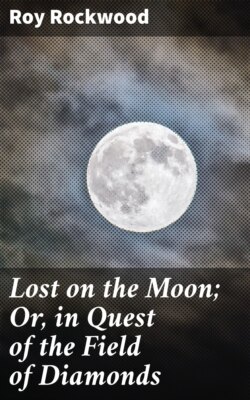Читать книгу Lost on the Moon; Or, in Quest of the Field of Diamonds - Roy Rockwood - Страница 8
На сайте Литреса книга снята с продажи.
PREPARING FOR A VOYAGE
Оглавление"Seems like rather an odd thing; doesn't it?" remarked Jack, as he and his chum walked along.
"What?"
"This note."
"Oh, yes. But what made you think the writing looked like that of the crazy machinist who tried to wreck the projectile?"
"Because I once saw some of the crazy letters he sent us, and he wrote just like the man who gave Dick this note. But come on, let's hustle, and see what's up."
In a few minutes they came in sight of the white bridge, which was about a quarter of a mile down the road from the professor's house. The two boys kept well together, and they were watching for a first sight of the man in waiting.
"See anything?" asked Jack.
"No; do you?"
"Not a thing. Wait until we get closer. He may be in the shadow. It's dark now."
Almost as Jack spoke, the moon, which had been hidden behind a bank of clouds, peeped out, making the scene comparatively bright. The boys peered once more toward the bridge, and, as they did so, they saw a figure step from the shadows, stand revealed for an instant in the middle of the structure, and then, seemingly after a swift glance toward the approaching chums, the person darted off in the darkness.
"Did you see that?" cried Jack.
"Sure," assented Mark. "Guess he didn't want to wait for us. Why, he's running to beat the band!"
"Let's take after him," suggested Jack, and, nothing loath, Mark assented. The two lads broke into a run, but, as they leaped forward, the man also increased his pace, and they could hear his feet pounding out a tattoo on the hard road.
The two youths reached the bridge, and sped across it. They glanced hastily on either side, thinking possibly the man might have had some companions, but no one was in sight, and the stranger himself was now out of view around a bend in the highway.
"No use going any farther," suggested Jack, pulling up at the far side of the bridge. "There are two roads around the bend, and we couldn't tell which one he'd take. Besides, it might not be altogether safe to risk it."
Mark and Jack, on their return, told Professor Henderson and the German scientist something of their little excursion.
"But who could he have been?" asked Mr. Roumann. "Perhaps if you ask the boy who brought the note he can tell you."
"We'll do it in the morning," decided Mark.
"It's peculiar that he wanted Mark to meet him," spoke Amos Henderson.
"Have you any enemies that you know of, Mark?"
"Not a one. But what makes you think this man was an enemy, Professor?"
"From the fact that he ran when he saw you and Jack together. Evidently he expected to get Mark out alone."
They discussed the matter for some time, and then the boys and the scientists retired to bed, ready to begin active preparations on the morrow, for their trip to the moon.
There was much to be done, but their experience in making other wonderful trips, particularly the one to Mars, stood the travellers in good stead. They knew just how to go to work.
To Washington was entrusted the task of preparing the food supply, since he was to act as cook. Andy Sudds was instructed to look after the clothing and other supplies, except those of a scientific nature, while the two young men were to act as general helpers to the two professors.
As the Annihilator has been fully described in the volume entitled, "Through Space to Mars," there is no need to dwell at any length on the construction of the projectile in which our friends hoped to travel to the moon. Sufficient to say that it was a sort of enclosed airship, capable of travelling through space—that is, air or ether—at enormous speed, that there were contained within it many complicated machines, some for operating the projectile, some for offence or defence against enemies, such as electric guns, apparatus for making air or water, and scores of scientific instruments.
The Annihilator was controlled either from the engine room, or from a pilot house forward. As for the motive power it was, for the trip to the moon, to be of that wonderful Martian substance, Cardite, which would operate the motors.
The projectile moved through space by the throwing off of waves of energy, similar to wireless vibrations, from large plates of metal, and these plates were the invention of Professor Roumann.
Perhaps to some of my readers it may seem strange to speak so casually of a trip to the moon, but it must be remembered that our friends had already accomplished a much more difficult journey, namely, that to Mars. So the moon voyage was not to daunt them.
Mars, as I have said, was thirty-five millions of miles away from the earth when the Annihilator was headed toward it. To reach the moon, however, but 252,972 miles, at the most, must be traversed—a little more than a quarter of a million miles. As the distance from the earth to the moon varies, being between the figures I have named, and 221,614 miles, with the average distance computed as being 238,840 miles, it can readily be seen that at no time was the voyage to be considered as comparing in distance with the one to Mars.
But there were other matters to be taken into consideration, and our friends began to ponder on them in the days during which they made their preparations.
